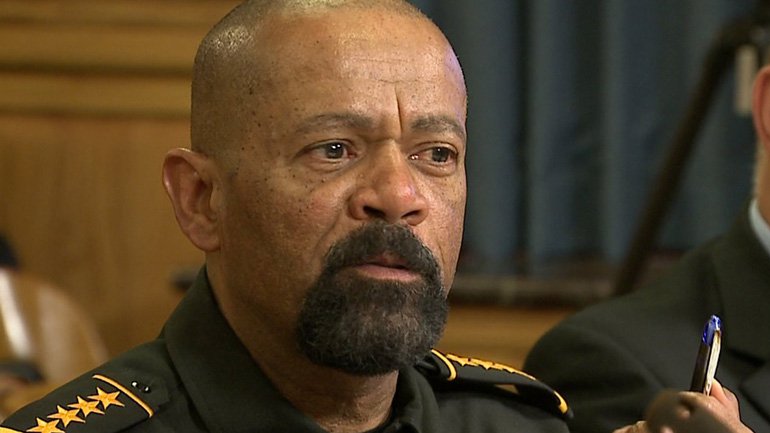

In May, Clarke was photographed atop the Milwaukee Journal Sentinel building, City Hall at his back, posing in full uniform for a page-one story on his political aspirations. “Despite his ‘aw shucks’ approach, he’s very sophisticated about the media in Milwaukee,” says public relations executive Evan Zeppos, who supported Clarke’s campaign. While Clarke has downplayed the flattering speculation, he has never dispelled it. A survey by the Small Business Times put him at the top of the list. A citywide survey by the Greater Milwaukee Association of Realtors identified him as one of the three most popular contenders, along with former Congressman Tom Barrett and Common Council President Marvin Pratt. He was suddenly a hot prospect, particularly within the business community. Within weeks of his election, Clarke’s name jumped up as a possible candidate for Milwaukee mayor. “He ended up in the paper nearly every day,” she says. Says Candy: “David has a clearer sense of who he is than just about anybody I’ve worked for in 20-some years.” When advising Clarke, Candy and Christofferson suggested that he make news once a week to raise his name identification with voters. He was kind of a natural.… He’s a fresh face, somebody who says what’s on his mind.”Ĭhristofferson teamed up with political fundraiser Barb Candy the two had worked together on past campaigns for Mayor John Norquist. “It has been phenomenal,” says political strategist Bill Christofferson, who ran Clarke’s campaign while coordinating Jim Doyle’s race for governor. Six-foot-four in black cowboy boots and GQ handsome, he cuts a commanding presence, a presence that played well with voters last fall in his first run for public office when he beat challengers hands down. The sheriff has found mass appeal as a new face, as a reformer. It’s hard to name a public leader in Milwaukee who has risen to such a high profile with such lightening speed. “The ‘good old boy’ network needed some changing.” But as Clarke admits, the selection of a black sheriff was a good move by the McCallum camp to win minority votes in Milwaukee.Ĭlarke had come out of nowhere to win the job, but since then, he has become nothing less than a public sensation. “We picked someone who we thought would make a difference,” says a former McCallum aide. Out a field of 10 applicants, Clarke was named sheriff on March 19, 2002, by then-Gov. Capitalizing on the opportunity, Clarke applied for the job. In January of last year, Milwaukee County Sheriff Lev Baldwin resigned unexpectedly to take a $300,000 pension payout before finishing his term. A few years ago, he began writing a 34-page plan designed to be his very specific blueprint for succeeding Police Chief Arthur Jones.īut circumstances intervened. In 1978, at age 21, he was sworn in as a Milwaukee police officer.Ĭlarke rose through the ranks at a slow but steady pace in his 24 years with the department, making captain in 1996.

Indeed, he has worked in law enforcement nearly all of his adult life. With his regimented background, Clarke, 46, was destined to wear a uniform. “He had every crease and pleat in place,” says David Clarke Sr. Imagine the sense of responsibility, knowing that each fold in the nylon chute could mean the difference between life and death for his father.īut the boy had his father’s full confidence. So well-disciplined was the boy that when his father continued to sky dive recreationally, he asked 11-year-old Dave to help him pack his parachute before every jump.
#FACEBOOF PAGE FOR SHERRIF DAVID CLARKE HOW TO#
“One thing about Dave, he knew how to follow orders,” his father says. Like father, like son, the young Clarke was taught to respect authority. They named him after his father, David Alexander Clarke Jr. The couple’s second child was their first son, born in August 1956. He and his wife, Jeri, would raise a family of five children. He moved to Milwaukee to take a job with the post office and soon married. The senior Clarke survived the war without a scratch and returned home with a chest full of medals.

When war broke out in Korea, he parachuted into combat along the front line. He was assigned to a tank battalion at Fort Knox, Kentucky.īut tanks weren’t exciting enough for the gung-ho enlistee, so he signed up to be a paratrooper with the elite 2nd Ranger Infantry Company. joined the Army in 1948 at just 16 years old. Born and raised in Beloit, David Clarke Sr. Purchase back issues of the magazine at /shop. This story appears in the July 2003 issue of Milwaukee Magazine.


 0 kommentar(er)
0 kommentar(er)
